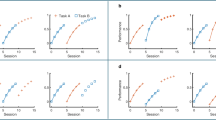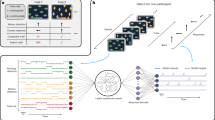Abstract
As we perform daily activities-- driving to work, unlocking the office door, grabbing a coffee cup-- our actions seem automatic and preprogrammed. Nonetheless, routine, well-practiced behavior is continually modulated by incidental experience: in repetitive experimental tasks, recent (~4) trials reliably influence performance and action choice. Psychological theories downplay the significance of sequential effects, explaining them as rapidly decaying perturbations of behavior with no long-term consequences. We challenge this traditional perspective in two studies designed to probe the impact of more distant experience, finding evidence for effects spanning up to a thousand intermediate events. We present a normative theory in which these persistent effects reflect optimal adaptation to a dynamic environment exhibiting varying rates of change. The theory predicts a heavy-tailed decaying influence of past experience, consistent with our data, and suggests that individual incidental experiences are catalogued in a temporally extended memory utilized to optimize subsequent behavior.
Similar content being viewed by others
Article PDF
Author information
Authors and Affiliations
Corresponding author
Rights and permissions
About this article
Cite this article
Wilder, M., Jones, M., Ahmed, A. et al. The persistent impact of incidental experience. Nat Prec (2012). https://doi.org/10.1038/npre.2012.6942.1
Received:
Accepted:
Published:
DOI: https://doi.org/10.1038/npre.2012.6942.1



